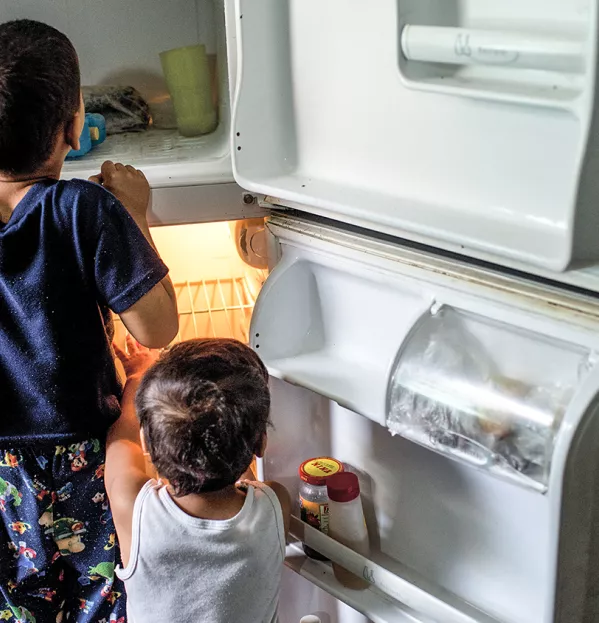‘Appalling’ number of pupils turn up hungry

A new report exploring the impact of poverty on how well children perform at school has just been published. Here, Tes Scotland looks at some of the key messages to emerge.
What is the report about?
Entitled What Support Works?, the report is the culmination of an inquiry, carried out by the Scottish Parliament’s Education and Skills Committee, into the attainment and achievement of pupils living in poverty.
What were the headline findings?
The committee was “appalled” to hear that teachers were seeing increasing numbers of children coming to school hungry or without having washed. An inability to pay for basics such as hot water or beds can reduce attendance at school and make it harder to learn, the report says.
What about the costs applied by schools?
Pupils in poverty avoid certain subjects - such as home economics, PE, and art and design - and extracurricular clubs or trips because of extra costs. Sometimes families struggle to meet homework demands because, for example, they cannot afford glue or glitter.
Were they any positive findings?
The report highlights “a huge amount of really positive work” by schools, such as clothing “swap shops”, counselling, breakfast clubs and summer clubs to tackle “holiday hunger”. But committee convener James Dornan warns of an urgent need for “more support to help teachers and school staff who are working so tirelessly on the front line”.
Are MSPs satisfied that all pupils living in poverty are being identified?
No. They want to see “more sophisticated indicators” of poverty. They identify a particular need to ensure that pupils in rural poverty do not slip under the radar as there is an “urban bias” in funding allocations at present.
What does the report make of the Pupil Equity Fund?
It finds much to praise about the Pupil Equity Fund (PEF), which is targeted at closing the attainment gap between poor children and their more affluent peers. It highlights new nurture groups, counselling services and youth work - but it also identifies some issues that may be limiting the impact of the fund.
Such as?
The PEF is throwing new tasks at Scotland’s already under-pressure headteachers - for example, procurement exercises - and staff were given “little preparation before they took on these new responsibilities”. Other problems include confusion among some heads over the circumstances in which schools can use PEF money to employ a teacher.
Does it identify other emerging challenges?
Yes. Notably “the increased use of digital platforms can have a disproportionate negative impact on young people living in poverty”. The move towards online payment systems for school trips and dinners, for example, “presupposes access to the internet”, which is not a reality for all families.
Does the report say anything about how poorer families view education?
Yes, MSPs were repeatedly told “the concept of ‘poverty of aspirations’ is a myth” - in other words, parents living in poverty are no less ambitious for their children to do well in education. However, they are more likely to aspire to apprenticeships and further education rather than university, and less likely to know how to help their children achieve their ambitions.
Is enough being done to help pupils who are not aspiring to university and may struggle with exams, but who excel in other ways?
No. The report is unequivocal on this: “Secondary schools’ success … is not measured by pupils’ achievement; rather success is often measured by formal exam results.” It cites evidence from Education Scotland chief executive Gayle Gorman, who “recognised that school leaders might be discouraged from investing PEF monies into achievement-based activities if the achievements are not fully recognised and accredited in a similar way to national qualifications”.
Does the report include any particularly compelling data?
The Joseph Rowntree Foundation looked at the number of young people from the most deprived areas attaining five or more National 5 or equivalent passes across different local authorities. In some councils the figure was more than 50 per cent, but in one it was less than 20 per cent. The Joseph Rowntree Foundation says the reasons for such variation are “not fully understood” but are “likely to include school leadership and culture, use of data to inform practice, improvements in teaching methods, targeted resourcing and relationships with families, communities and wider stakeholders”.
How have child poverty experts reacted to the report?
John Dickie, director of the Child Poverty Action Group in Scotland, says it “makes quite clear that children growing up in families struggling on low incomes face real cost barriers that too often prevent them from getting the most out of what Scotland’s schools have to offer”. But reducing the costs levied by schools is not enough, he says. “The UK government must end the freeze on family benefits, while here in Scotland ministers must deliver on their promise of an income supplement for families as a matter of absolute urgency.”
How has the Scottish government responded to the report?
It points to the £750 million earmarked to address the “poverty-related attainment gap”, and initiatives such as £1 million for support for “children experiencing food insecurity during school holidays”, as well as the recent decision to set school clothing grants at a minimum of £100 throughout Scotland from 2018-19 (grants have been less than half of that in some areas). A spokesman also says Scotland is the only part of the UK with targets to “ultimately eradicate child poverty”.
You need a Tes subscription to read this article
Subscribe now to read this article and get other subscriber-only content:
- Unlimited access to all Tes magazine content
- Exclusive subscriber-only stories
- Award-winning email newsletters
Already a subscriber? Log in
You need a subscription to read this article
Subscribe now to read this article and get other subscriber-only content, including:
- Unlimited access to all Tes magazine content
- Exclusive subscriber-only stories
- Award-winning email newsletters